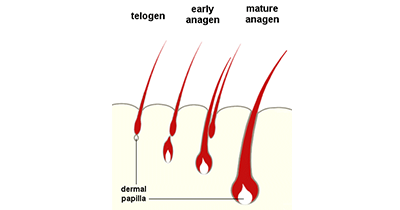Hair loss is a result of several reasons such as hormonal disturbance, anemia, sleeping disorders, stress, unhealthy diet etc. But when we say certain medicines may cause hair loss as well, it seems surprising. Medicines are made to treat the diseases but as we all know, they may generate some side effects. One of such side effects is hair loss.
Certain medicines may stop the natural hair growth cycle, change the hair texture or hair color and in some cases, they cause severe hair loss.
How medicines affect the hair
There are three main phases of hair growth cycle, anagen catagen, and telogen. During anagen, the hair grows, during catagen, the hair prepares for telogen phase and during telogen phase, the hair rests. During this phase, older hairs are shed replaced by newer hairs.
There are two types of hair loss caused by medicines:
Telogen effluvium:
This type of the hair loss causes the hair to go into the telogen phase. The symptoms of this type appear within two to four months after taking the medicine.
Anagen effluvium:
This type takes place during the anagen phase and the symptoms may appear within a few days to weeks after taking the medicines.
The severity of the hair loss depends on the type and dose of the medicine. In most of the cases, the hair loss caused by medicines is temporary and the hair grows back once the patient stops taking the medicine.
The medications are given below causing hair loss:
Chemotherapy medications:
Chemotherapy medicines lead to anagen effluvium hair loss since they kill the cancer cells, they may kill the healthy cells of the body including hair matrix cells.
Blood Thinners:
Blood thinners or anticoagulants help in certain complication like heart disease. These medicines may cause telogen effluvium hair loss. Some of the blood thinners causing hair loss are Warfarin sodium, heparin etc.
Vitamin A supplements:
Large doses of Vitamin A may cause telogen effluvium. When taken in large doses, vitamin A may lead to telogen effluvium.
Beta Blockers:
Beta blockers are helpful in heart disease and blood pressure and they are also known to cause severe hair loss. Some examples of Beta blockers are Atenolol, Nadolol etc.
Gout Medications:
Allopurinol is a medicine that is used to treat gout, can also cause telogen effluvium.
Antidepressants:
Certain medications used to treat depression and anxiety may cause hair loss.
Angiotensin-Converting Enzyme Inhibitors:
Angiotensin-converting enzyme inhibitors are used for treating blood pressure, can lead to telogen effluvium hair loss.
Hormonal medications:
Males taking testosterone or anabolic steroids may face severe hair loss. Oral contraceptives and hormone replacement therapy may lead to hormonal changes in women causing hair loss.





